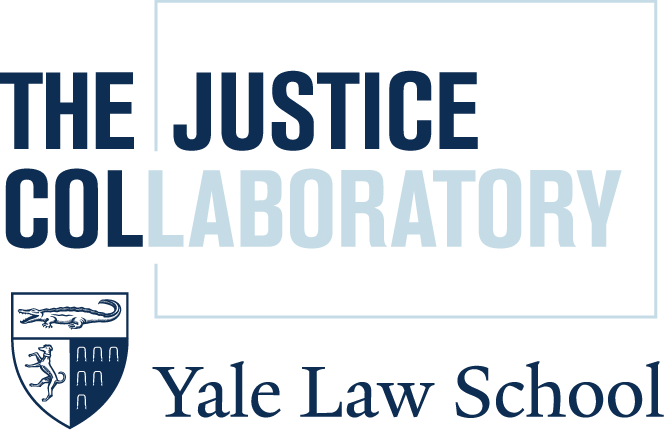Moving Justice Forward Conference
Summary
On October 5-6, 2017, the Justice Collaboratory at Yale Law School hosted the Moving Justice Forward conference, which convened scholars, policymakers, and practitioners to discuss how to advance reforms of the criminal justice system in the absence of progressive federal leadership.
Agenda
The agenda was inspired by the Justice Forward vision which asserts that successful efforts toward justice reform must enhance legitimacy by increasing trust among individuals, communities, and the state. Conversations were organized in order to encourage cross-sector, multi-disciplinary conversations, to expand our collective understanding of approaches to justice issues especially as they align with other systems such as via education, health care, community development, etc.
Below, you will find brief summaries of these conversations which will be further developed into a Moving Justice Forward Action Agenda to be disseminated January 2018.
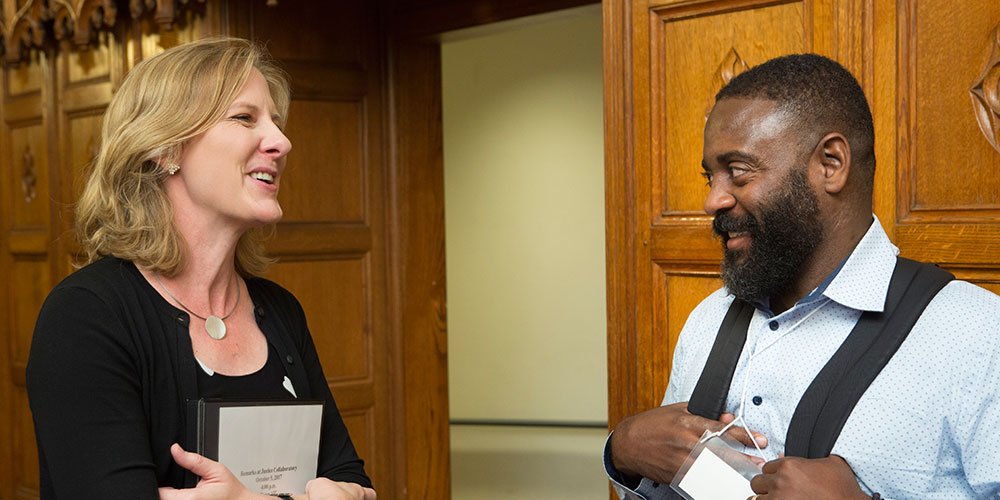
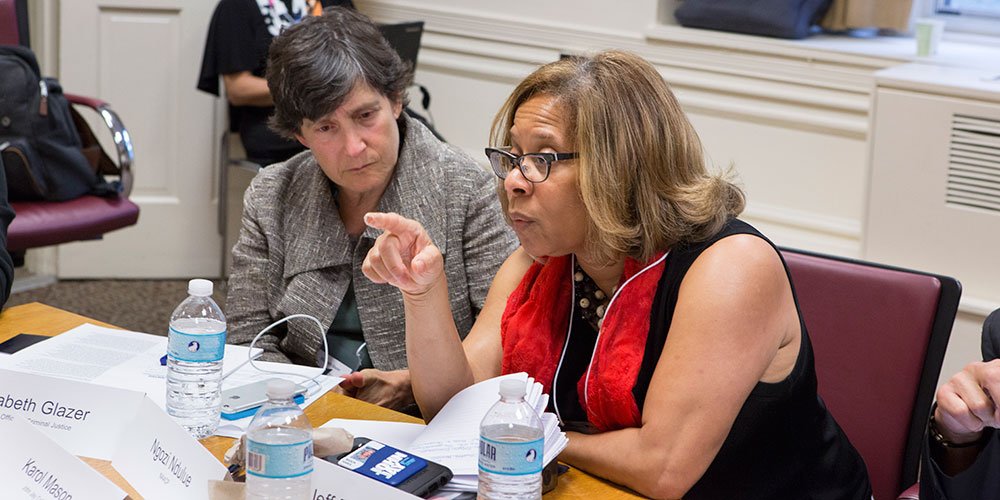
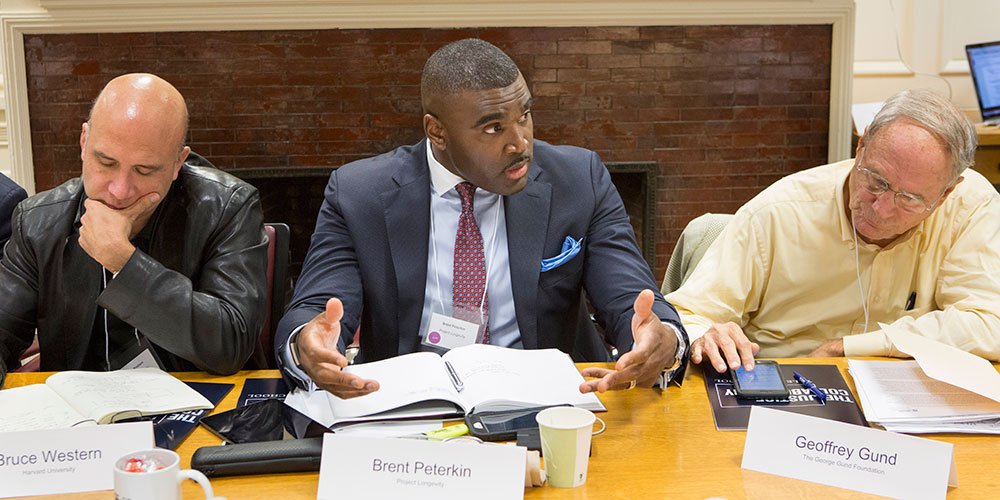
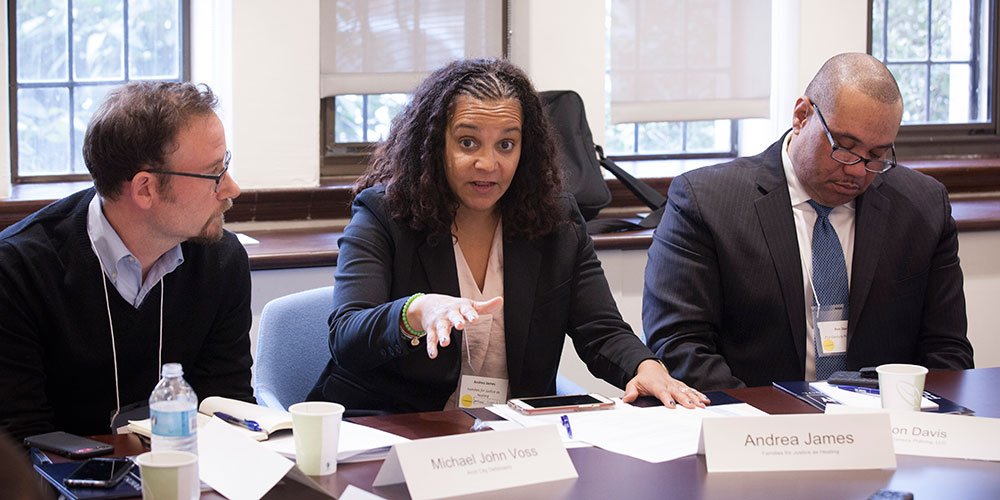
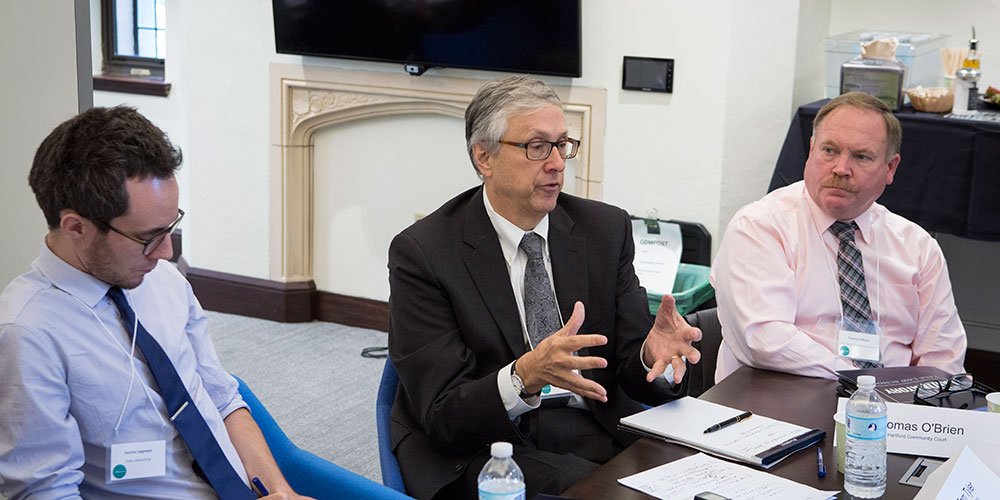
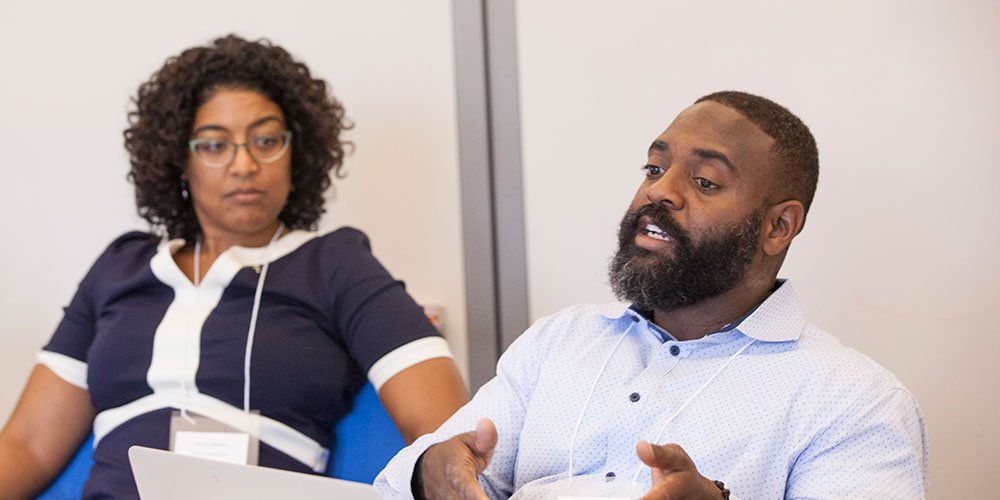
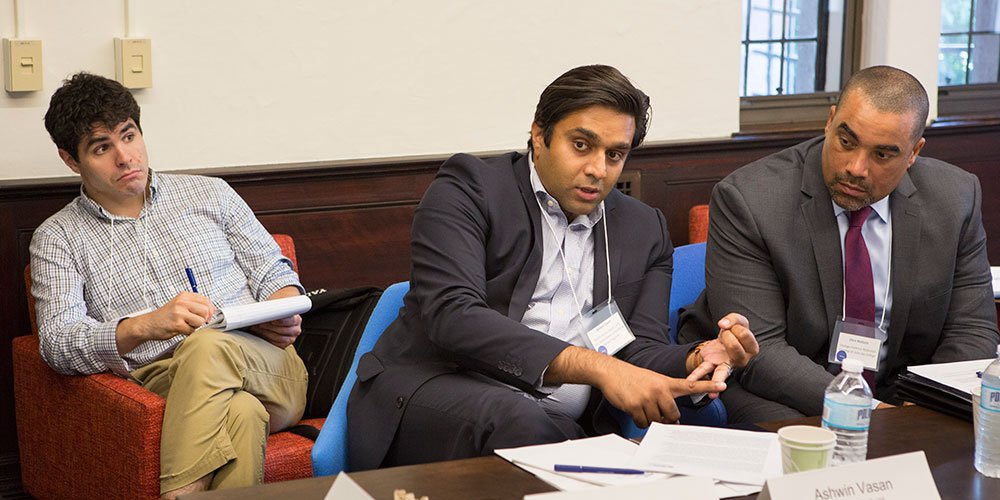
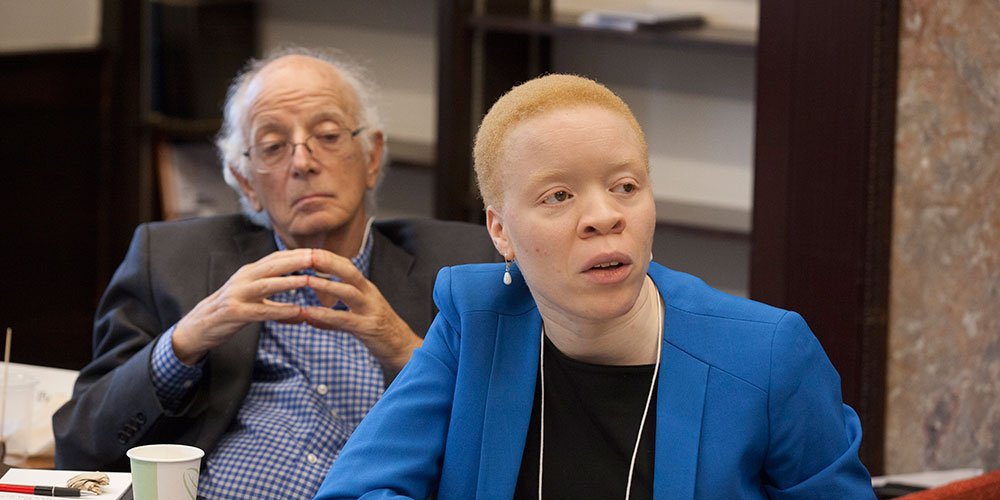
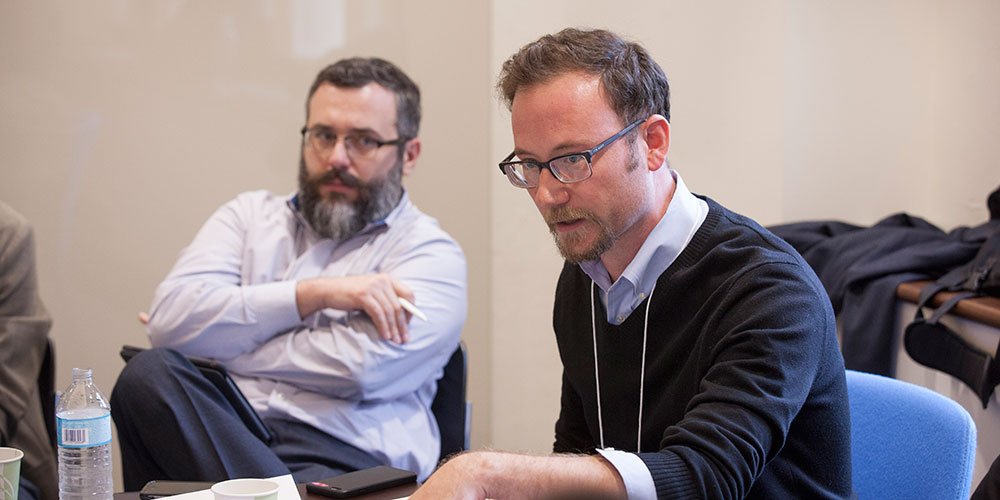
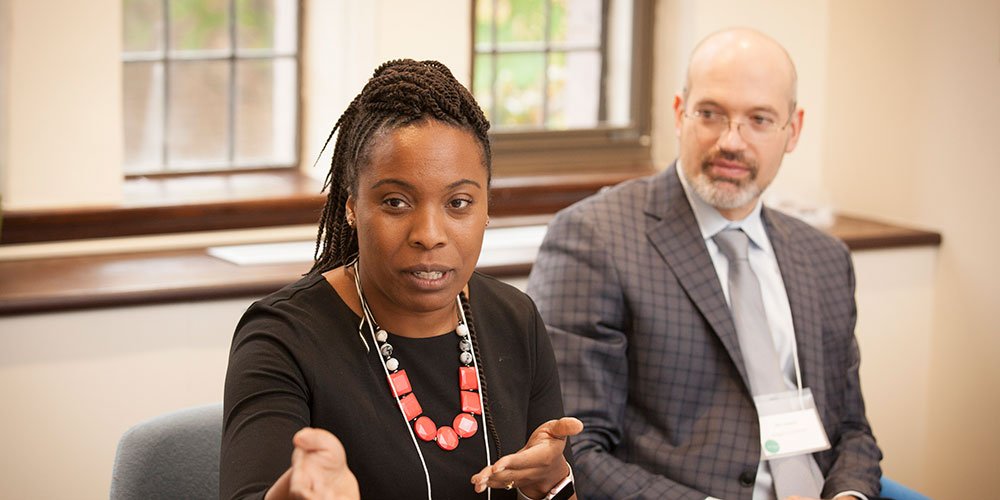
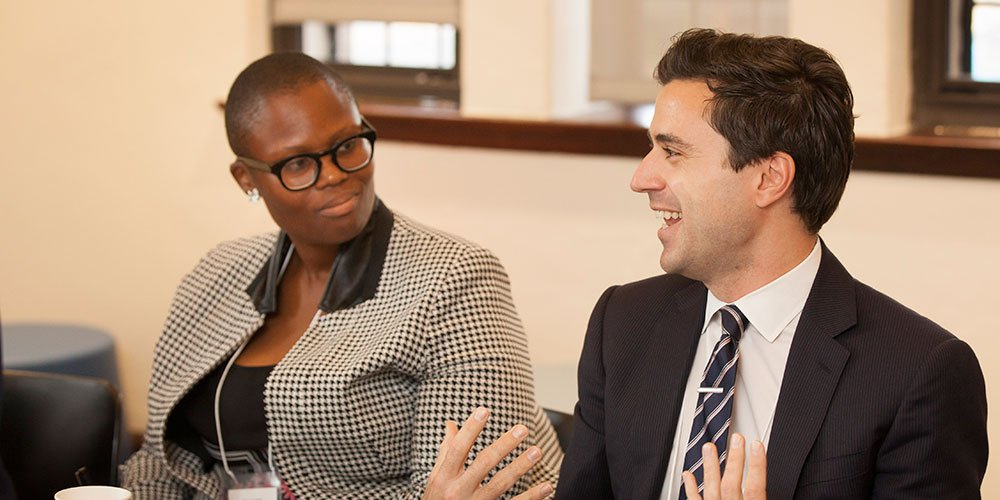
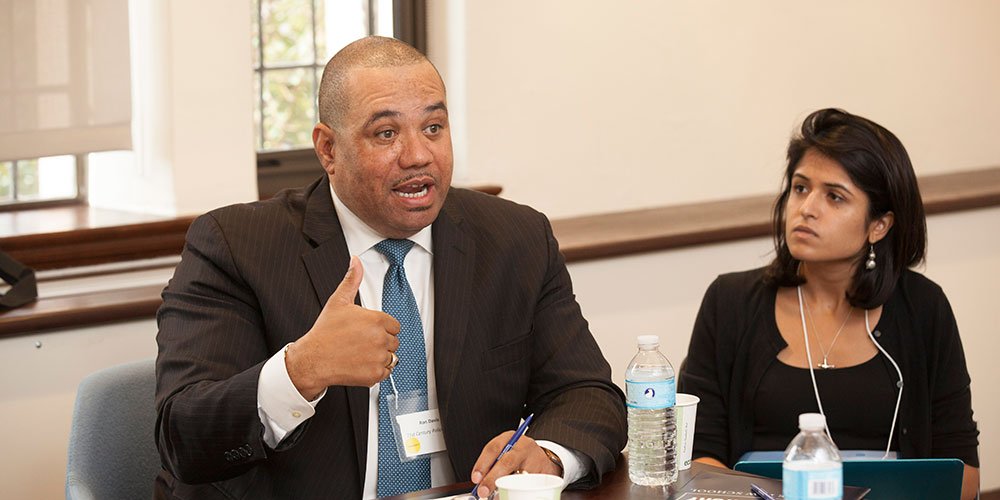
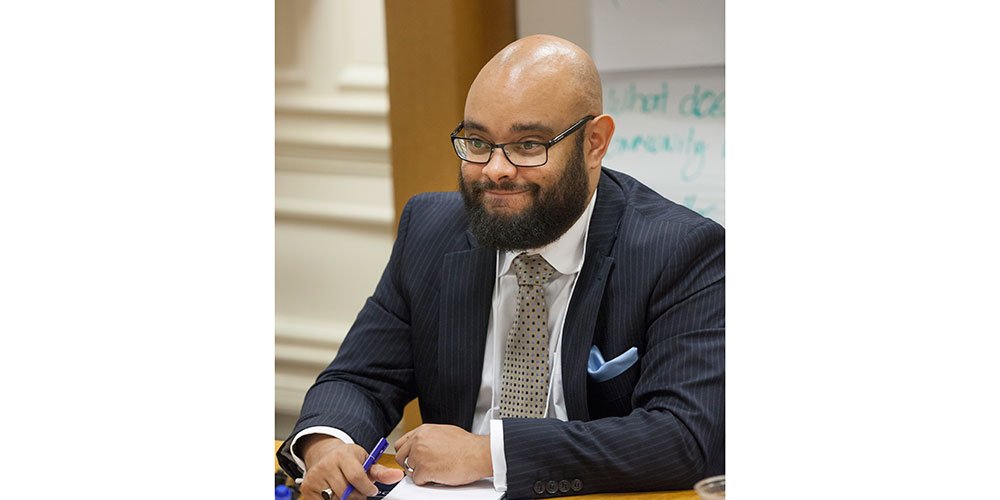
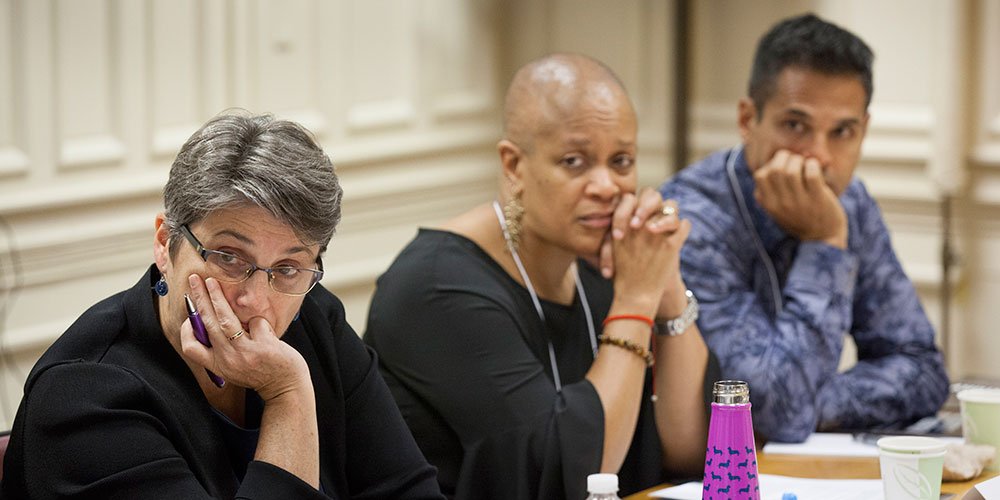
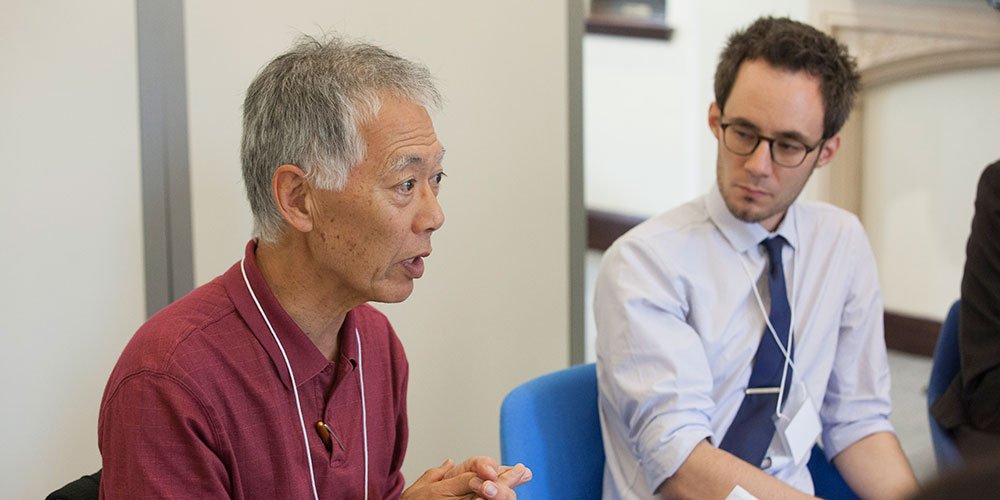
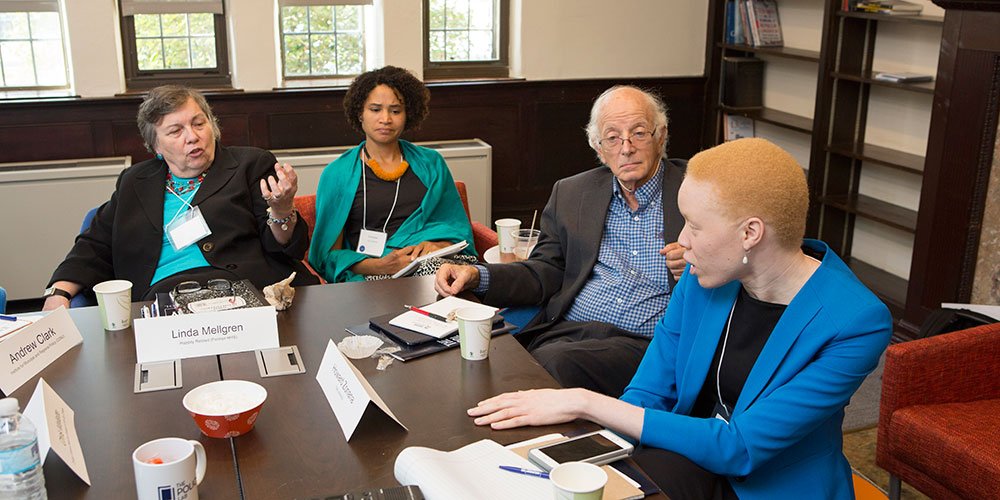
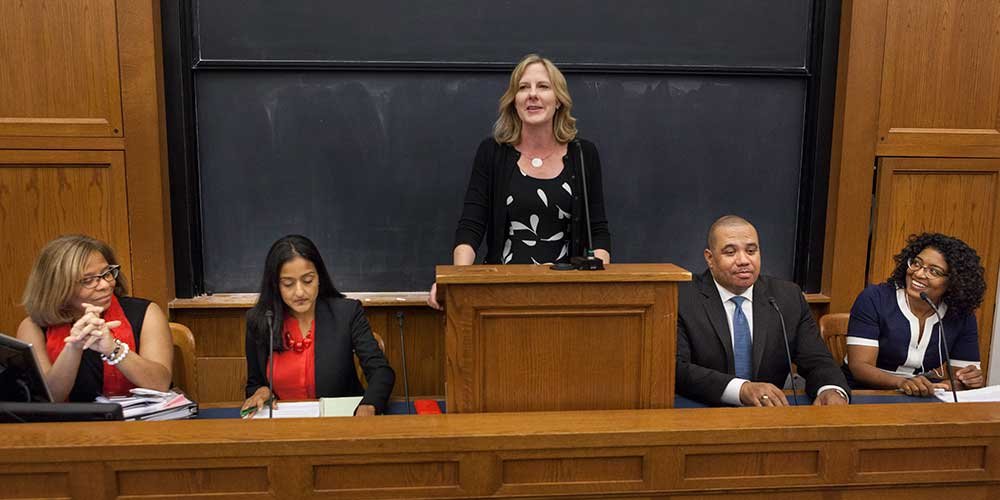
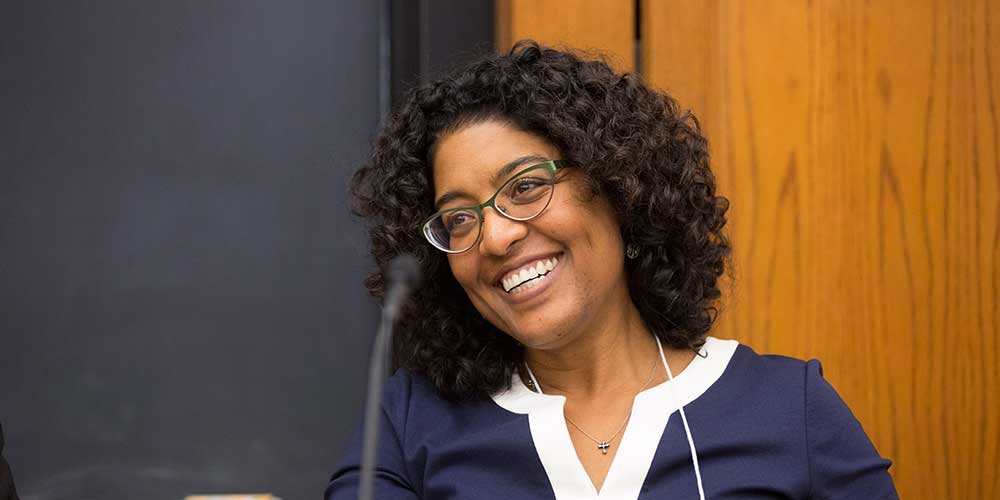
Keynote Panel:
Moving Justice Forward in the Absence of Federal Leadership
The conference keynote panel featured some of the most prominent champions of modern criminal justice reform in a discussion on ways that criminal justice reform might continue to advance without federal coordination and leadership and what states and local jurisdictions can do to fill the void.
Some key take-aways:
Federal leadership is not necessarily needed to continue the forward progress of criminal justice reform achieved over the last decade. The power and innovation behind these reforms lies at the state and local levels. A number of examples were put forth such as Andrew Clark's efforts to work with community-based organizations to address racial profiling in traffic stops and NYC's initiatives to create "youth hubs" for crime prevention and using funding to forward stalled initiatives such as the testing of rape kits.
Important stakeholders within the law enforcement community have communicated that they want and need criminal justice reform in order to increase the efficiency and safety of the work they do. The efforts that were started are working. Cy Vance gave the example that New York City has been able to substantially decrease arrests for low-level offenses while continuing to see crime decline in the city.
Collaboration and data are key elements that will be essential to continued criminal justice reform efforts. Moving reforms forward requires that we reach across sectors and silos to connect with "unlikely allies" who share the same goals- even if they are approaching the problem from a different angle. Similarly, responsible data collection and analysis will be an essential factor in the production of robust, evidence-based policies. This is of particular importance as a narrative of "counter research" continues to take hold in this country.
Watch a video of the keynote panel here.
Moderator:
Tracey Meares, Walton Hale Hamilton Professor of Law and Faculty Director of the Collaboratory
Panelists:
Ron Davis, Principal Consultant at 21st Century Policing
Vanita Gupta, President and CEO of The Leadership Conference on Civil and Human Rights
Karol Mason, President of John Jay College of Criminal Justice
Cy Vance, Jr., New York County (Manhattan) District Attorney
Collaborating Across Sectors in Support of Criminal Justice Reform
The idea for a plenary panel emerged from Justice Collaboratory planning conversations about the important work that needs to be done to bridge silos and work across sectors that have an impact on (or are impacted by) the criminal justice system. The panel brought together representatives from academia, government, philanthropy, media, NGOs and the community to discuss the opportunities and challenges of collaboration and stepping outside of one's professional comfort zone to advance criminal justice reform.
Major take-aways include:
The role of philanthropy/ government/ NGOs/ academic institutions are key players that can catalyze partnerships within the justice system and across sectors that align with the system. However, true collaboration requires a certain "abdication of sovereignty" in order to bring all of the stakeholders to the table- which is why identifying a common goal becomes so important.
Collaboration requires a set of common goals and a baseline understanding of how these goals fit together. Reducing crime, reducing incarceration, public safety, and the promotion of fairness are goals that thread various reformers together. However, the ways in which actors achieve these goals may be at odds. For instance, ensuring public safety reaches well beyond the criminal justice system and should not simply be "enforced" by the police. Public safety should more often be the result of civic participation which relies on enhancing trust and legitimacy in the system to produce policies and reforms that endure.
Overcoming obstacles to collaboration require shared incentives in addition to a set of shared goals. Disincentives to collaboration are very high. Staying in one's silo is attractive because it can provide efficiencies, enhance specialization, and increase organizational capacity. As a result, asking stakeholders to collaborate across silos, to step into arenas in which they know very little or feel they have little professional capacity, can make them feel vulnerable and resistant. Identifying and providing incentives, possibly in the form of a shared pool of resources, might help change organizational calculations and increase collaboration.
Building meaningful and durable partnerships with communities is an essential component of durable reform. Building these partnerships requires working with individuals who have established credibility across a number of different partners with different agendas and mandates. Doing this effectively is hard and means thinking beyond traditional stakeholders and tapping deeper into residents in the community in order to broker relationships between various constituencies. Clarity, communication, and community collaboration around the kinds of initiatives on the table are critical elements in building community partnerships.
The media play a critical role in "giving oxygen" and a platform to the ideas, campaigns, research, and philanthropic and community initiatives that drive criminal justice reform. Media can be a galvanizer for criminal justice advocacy but must maintain professional independence and integrity that allows them to publish in national news outlets, ultimately increasing awareness and impacting policies around criminal justice issues.
Watch a video of the plenary discussion online here.
Opening speaker:
Mike Lawlor, Under Secretary for Criminal Justice Policy and Planning, State of Connecticut
Moderator:
Thomas Abt, Senior Research Fellow, Center for International Development, Harvard University
Panelists:
Caroll Bogert, President, The Marshall Project
Elizabeth Glazer, Director, NYC Mayor's Office of Criminal Justice
Brent Peterkin, Connecticut Statewide Coordinator, Project Longevity
Nicholas Turner, President and Director, Vera Institute of Justice
Nina Vinik, Director, Joyce Foundation Gun Violence Prevention Program
Education Working Group Summary
The education working group asked a set of overarching questions targeted at addressing the parallels and overlap between our educational and criminal justice systems. The group identified key issues for focus and change, and discussed possible strategies to address them.
Questions
What is the role of law enforcement in schools?
And what is the role of schools-are they acting as a positive force within the "school" to "prison" dichotomy?
What practices and systems should be considered in addressing the school-to-prison pipeline?
What collaborative ventures might be engaged to address the school-to-prison pipeline?
Key Issues for Focus and Change
Measurement: We need to carefully consider the metrics we are using to measure outcomes beyond crime rates in neighborhoods and test scores in schools. What other metrics might we use to collect meaningful data and hold institutions accountable? How can we use this data to produce tangible examples and highlight best practices that can lead to policy change?
School vs. Criminal Justice System Engagement: It is critically important to determine what kinds of infractions should engage administrative school structures and not escalate to law enforcement involvement.
Organizing: Activate youth and communities to understand histories of oppression and engage the underlying structural causes of the issue.
Resources: Funding needs to be allocated/ reallocated to support school counselors, students, and to fund prosocial strategies for addressing student behavior instead of diverting money to pay for law enforcement in schools.
Leadership: School systems must develop strategies to develop and retain effective leaders as a means to improving school climate.
Some Key Strategies
Use of Positive Behavior Interventions and Supports (PBIS) and models of Restorative Justice to establish the behavioral supports and positive climate that leads students to achieve social, emotional, and academic success
Implicit bias training and trauma-informed approach training in both the education and criminal justice systems
Legitimizing the school experience for all youth by integrating culturally-competent pedagogy into school curricula
Develop frameworks for including community-informed and community-led solutions
Moderator
Carla Shedd, Associate Professor of Urban Education and Sociology, CUNY Graduate Center
Discussion Leaders
Jaime Koppel, Deputy Director for Strategic Partnerships, Communities for Just Schools
Thomas Mariadason, Director, The Justice Project at The Advancement Project
George Sugai, Professor, Special Education, University of Connecticut
Working Group Participants:
Benjamin Justice, Professor and Chair, Department of Educational Theory, Policy, and Administration, Rutgers University
Joscha Legewie, Assistant Professor of Sociology, Yale University
Thomas O'Brien, Senior Assistant State's Attorney, Connecticut Division of Criminal Justice
Tom Tyler, Professor of Law and Psychology, Yale Law School
Health, Victimization and Trauma Working Group Summary
Participants in this working group discussed the ways in which progress made under the previous administration to address critical issues such as mental health, addiction, victimization, and trauma could be sustained and enhanced as the ACA continues to be dismantled. The group developed a set of thoughts and recommendations about next steps to approaching this issue.
One Big, Bold Idea: Civilianize Healthcare in Correctional Settings
The healthcare system that is currently employed in American jails and prisons is completely separate from the healthcare system that treats the general public. This is the result of a Medicaid "carve out" that prohibited the reimbursement of jails and prisons for any type of medical services. One idea is that we improve the quality and continuity of care by eliminating this restriction, thereby "civilianizing" healthcare in correctional facilities.
Other Strategies to Consider
Address mental health in all aspects of the criminal justice system. This includes looking for points of mental health intervention along the continuum from prevention to reintegration of those who come into contact with the criminal justice system. It is equally important to understand and address the mental health needs of officers and others working in the criminal justice system.
Create Health-Justice research partnerships. One consistent challenge of working with criminal justice involved populations is the issue of measurement. Creating research partnerships between the health and criminal justice systems who often serve the same population of "frequent flyers" would greatly benefit from shared data collection and sharing. Inclusion of health measures in evaluation of criminal justice services vice versa would allow for improved services and continuity of care.
Trauma 1st Conference. Trauma is a truly an issue that cuts across disciplines and sectors and we must increase focus on identifying, screening and treating trauma. One strategy for more effectively understanding and addressing the issue would be to pull people from healthcare, education, law enforcement, communities to have conversations that are not dominated by one particular group but that can contribute various perspectives and opportunities for collaboration to the issue of trauma.
Articulate a set of legitimacy measures related to health, education, and criminal justice. The Justice Collaboratory should articulate a set of measures that can be integrated into studies in health, education, and criminal justice in order to emphasize the importance of trust and legitimacy in the fair functioning of these systems. Having these measures ready-to-go would facilitate their inclusion into research domains related to criminal justice system reform.
Develop frameworks and opportunities for mutual health-criminal justice advocacy. There are a number of health advocacy efforts that promote positive criminal justice outcomes and there needs to be more outspoken champions coming from the law enforcement community. Cognitive Behavioral Therapy (CBT) may present one promising opportunity for this type of mutual advocacy since it has been proven to have a positive impact in both domains and already experiences some cross-cutting support.
Investigate how individuals move between these systems in a way that supports mutually positive outcomes. Most often health care officials are being invited into criminal justice spaces in order to discuss how they can improve criminal justice outcomes. Let's investigate how criminal justice measures might be used to support positive health outcomes.
Expand Crisis Intervention Team (CIT) training to improve linkages between law enforcement and mental health services.
Moderator
Emily Wang, Associate Professor, Yale Medical School
Discussion Leaders
Thomas Abt, Senior Research Fellow, Center for International Development, Harvard University
Linda Mellgren, Senior Social Science Analyst (retired), Department of Health and Human Services
Ashwin Vasan, Executive Director, Health Access Equity Unit, NYC Department of Health and Mental Hygiene
Working Group Participants
Arielle Baskin-Sommers, Assistant Professor of Psychology and Psychiatry, Yale University
Andrew Clark, Director, Institute for Municipal and Regional Planning, Central Connecticut State University
Chris Mallette, Executive Director, Chicago Violence Reduction Strategy, John Jay College of Criminal Justice
Ngozi Ndulu, Senior Director of Criminal Justice Programs, NAACP
Ifeoma Nwokoye, Nurse Practitioner
Scott Semple, Commissioner, Connecticut Department of Corrections
Sean Smoot, Chief Legal Counsel, Police Benevolent and Protective Association of Illinois
Howard Zonana, Professor of Psychiatry, Yale University and Clinical Professor (Adjunct) of Law, Yale Law School
Community Working Group Summary
The Community working group investigated the community as a locus of justice reform. True community or neighborhood-level interventions are uncommon, frequently unevaluated, and suffer from a lack of conceptual clarity. Participants in these sessions addressed issues of inclusion, intervention strategies, accountability, measurement and resources. They organized their report-back into three "buckets."
Locus of Change
Place is a locus of intervention. Community is a place where that is uniquely positioned to discuss the intersectional approach of the criminal justice issues we're discussing with respect to education, health, law enforcement, etc.
Multi-Polar Capacity Building
Rethinking the diagnosis of social problems in communities. We need not only to identify problems within the community but to also identify injustices and assets. This would allow for a deeper analysis at the front end.
Training for the community on engagement with the system. This type of training can have a huge impact on the quality of activism. For example, the community needs to know that they play a role and can influence the election of prosecutors.
Training for those who are most affected by the system. We can no longer pay lip service to "working with the community" and instead need to acknowledge and contribute toward building the capacity and leadership skills of community members.
Training for academics and researchers in order to more effectively engage with and understand communities. Researchers need to understand the history, structures, and dynamics that exist within a community if they are to more effectively work with community members in the development of strategies and interventions.
Build a cumulative capacity for doing this work. Conferences such as Moving Justice Forward need to develop ways to drive the conversations we've had here forward rather than starting over with each new gathering.
Engage in racial and class analysis. Researchers need to widen the scope of their toolkit to include these types of analysis in order to more meaningfully engage with those who's experiences may diverge from their own. Investigating the systemic underpinnings of race and class dynamics is an essential component of working with communities.
Shifting Power
Acknowledge that to work meaningfully with communities involves a power shift.
Develop a set of standards for researchers and academics that require them to actively shift power to the communities. This might mean reallocating resources and funds to the community instead of simply using those funds to conduct their own work.
Ensure that interventions are truly community driven initiatives.
Develop mechanisms of accountability to the community. Academics and researchers should be required to abide by a set of accountability measures as a prerequisite of conducting their work.
Avoid contributing to "engagement fatigue." Many communities have experienced repeated interventions and either are not made aware of the results or see no change in their communities as a result of these interventions. This may mean identifying and providing real incentives for participation and not just giving the community "the gift of inclusion."
Decenter whiteness in the work that is done.
Moderator
Monica Bell, Assistant Professor, Yale Law School
Discussion Leaders
Ronald Davis, Principal Consultant at 21st Century Policing
Andrea James, Founder, Families for Justice as Healing
Andrew Papachristos, Professor of Sociology, Yale University
Julia Ryan, Vice President, Local Initiatives Support Corporation
Working Group Participants
Matthew Barge, Executive Director, Police Assessment Resource Center
Dwayne Betts, PhD Candidate, Yale Law School, American Poet, Memoirist
Rodrigo Canales, Associate Professor of Organizational Behavior
Matthew DeMichele, Research Sociologist, RTI International
LB Eisen, Senior Counsel, Justice Program, The Brennan Center for Justice
Barry Friedman, Professor of Law, New York University
Tracey Meares, Professor of Law, Yale Law School
Michael John Voss, Co-Founder and Director of Operations, Arch City Defenders
Justice System Working Group Summary
Participants in the justice working group focused on opportunities to recognize and develop synergistic collaborations to promote just outcomes for individuals touched by criminal justice institutions. Some of the most impactful advancements have come from work across justice agencies, however, there are significant hurdles to be crossed, including but not limited to institutional inertia. The group identified a number of threats and opportunities condensed and summarized below.
Key Issues for Focus and Change
Communities: We must find ways to empower communities, to treat them with dignity, not just "include" them in our work, but work in service to communities. Systems must be accountable to communities, which requires systems and values alignment focused on communities.
Equity: Our systems should be reoriented around measurable equity with regard to the costs and benefits of public safety. Safety must be understood as more than just keeping people free from physical harm, but in a much broader sense, as a service that supports the most vulnerable people and populations.
Accountability: Data that is typically collected by institutions is flawed in that it does not provide nearly enough measures of accountability. These measures should focus on social integration, empowerment and proportionality. Accountability should include ways to measure how communities and the individuals within them are provided with services that allow them to thrive.
Parsimony: Institutions should provide services while having the "lightest touch" it possibly can, strategies should be as minimally intrusive as possible.
Some Key Strategies
Change the narrative to include both structural causes of community and individual problems (i.e. racism). The narrative tends to focus on one thing and then another (policing, decarceration) but the problems are multi-faceted and span intuitions. The narrative should be revised to incorporate these complexities. A new generation of "cultural influencers" (such as Colin Kaepernick) represent an opportunity to change the narrative.
Leverage opportunities for governors, mayors and other local leaders to build coalitions among impacted and invested parties. There is a broad base of people who are affected by systems and could potentially support change but who have not been engaged in the process. Leaders need to think beyond their own tenure to create 5, 10, and 15 year plans and then work to get buy-in from involved organizations so that change will be institutionalized.
Identify "forgotten actors" who can be reactivated to produce change. There are numerous organizations that are not being used to their full potential but could be reengaged or reconceived to produce long-term change efforts rather than simply maintaining the status quo (state organizations that certify police training are being underutilized, for ex.)
Moderator
Phil Goff, Professor in Policing Equity, John Jay College of Criminal Justice
Discussion Leaders
Ana Bermudez, Commissioner, NYC Department of Probation
Tracie Keesee, Deputy Commissioner of Training, New York Police Department
Adam Mansky, Director of Operations, Center for Court Innovation
Cy Vance, Jr., New York County (Manhattan) District Attorney
Working Group Participant
Emily Bazelon, Lecturer in Law and Senior Research Scholar, Yale Law School
Maurice Classen, Program Officer, The MacArthur Foundation
Jeffrey Fagan, Professor of Law, Columbia University Law School
Elizabeth Glazer, Director, NYC Mayor's Office of Criminal Justice
Geoffrey Gund, President, The George Gund Foundation
Karol Mason, President, John Jay College of Criminal Justice
Marc Mauer, Executive Director, The Sentencing Project
Chauncey Parker, Executive Assistant District Attorney, New York County District Attorney's Office
Brent Peterkin, Connecticut Statewide Coordinator, Project Longevity
Nicholas Turner, President and Director, Vera Institute of Justice
Nina Vinik, Director, Gun Violence Prevention Program, The Joyce Foundation
Bruce Western, Professor of Sociology, Harvard University
